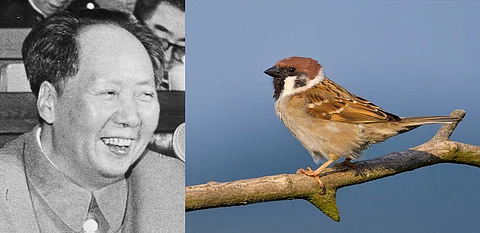

While most of us love the humble sparrow, sometimes, it can become an enemy of the state. This is what happened in 1958, eight years after the People’s Republic of China was declared.
Mao Zedong (Mao Tse-Tung), who defeated the Nationalists of the Kuomintang in a bloody civil war to bring China under Communist control in 1949, was no environmentalist. Indeed, ‘man should conquer nature’, he declared.
“Mao Zedong didn’t respect nature. The Chinese leader, who ruled between 1949 until his death in 1976, thought nature should be subservient to human wants and needs, not the other way around. His slogan Ren Ding Shen Tian (Man Must Conquer Nature) became a rallying cry, and in 1958 he famously declared: “Make the high mountain bow its head; make the river yield the way,” wrote Jemimah Steinfeld in her 2018 paper, China’s deadly science lesson: How an ill-conceived campaign against sparrows contributed to one of the worst famines in history.
It was 1958. The start of the Great Leap Forward, a disastrous campaign to make largely agrarian China an industrial powerhouse.
As part of the Great Leap, Mao launched his Four Pests campaign to eliminate what he thought were species that were endangering public health by spreading pestilence and disease. These included rodents that spread the plague, mosquitoes that spread malaria, flies and the sparrows (the Eurasian tree sparrow Passer montanus) that ate grain.
Scientists in China had arrived at a magic figure: Each sparrow consumed 4.5kg of grain each year. If a million sparrows were killed, 60,000 people would be able to avail food.
As Steinfield notes again, “As part of the Four Pests campaign – a hygiene campaign against flies, mosquitoes, rats and sparrows – people were called upon to shoot sparrows, destroy their nests and bang pots and pans until the birds died of exhaustion. Millions of sparrows, perhaps even hundreds of millions, were killed. The measure though left crops vulnerable. Pests such as locusts became the real winners, as they had lost a major predator.”
In the end, Mao had to call off his war against sparrows and replaced them with bed bugs. But the damage had been done. Locusts, combined with other factors, brought about the Great Chinese Famine (1959-1961).
“Mao called off the sparrow campaign, but it was too late. A perfect storm had gathered. A toxic combination of widespread deforestation, misuse of poisons and pesticides and misinformed agricultural policy combined with poor weather to create a devastating famine. Up to 45 million people died,” writes Steinfield.